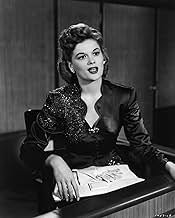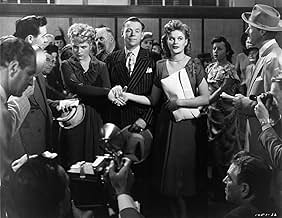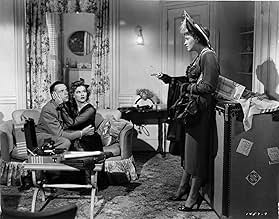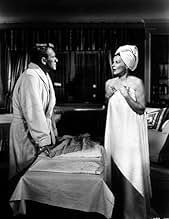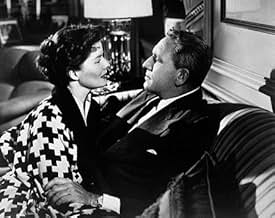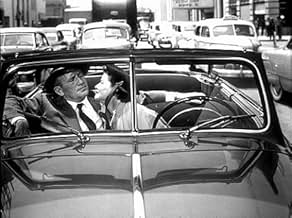NOTE IMDb
7,4/10
24 k
MA NOTE
Les tensions familiales et professionnelles augmentent lorsqu'un mari et une femme travaillent comme avocats opposés dans une affaire impliquant une femme qui a tiré sur son mari.Les tensions familiales et professionnelles augmentent lorsqu'un mari et une femme travaillent comme avocats opposés dans une affaire impliquant une femme qui a tiré sur son mari.Les tensions familiales et professionnelles augmentent lorsqu'un mari et une femme travaillent comme avocats opposés dans une affaire impliquant une femme qui a tiré sur son mari.
- Réalisation
- Scénario
- Casting principal
- Nommé pour 1 Oscar
- 3 victoires et 5 nominations au total
Edward Andrews
- Kip's neighbor
- (non crédité)
Bonnie Bannon
- Woman in Courtroom
- (non crédité)
Charles Bastin
- Young District Attorney
- (non crédité)
Harry Baum
- Commuter
- (non crédité)
Joseph E. Bernard
- Mr. Bonner - Adam's Father
- (non crédité)
Avis à la une
Not as dramatic, engaging or funny as has been suggested but the lead pair make it well worth seeing
Adam and Amanda Bonner are happily married, despite the sparky nature of their relationship. Lawyers each, both are interested in a newspaper report of a woman who shot (but not killed) her husband when she discovered him in the arms of another woman. The Bonner's take differing views of the case and it is no surprise that Adam ends up prosecuting while Amanda is Doris Attinger's defence counsel. With the gloves off in the courtroom with a legal battle of sexual equality, it is no surprise that the conflict and disagreements don't end at the front door and soon it is all kicking off.
The issue of sexual equality may have moved on from where it was in the middle of the last century but this film occasionally hits an interesting point, even if the majority of it is fairly shallow and a bit unconvincing in terms of legal argument. Without really engaging me, the film still held my interest as the story developed and it was fairly enjoyable even if it couldn't settle on whether or not it is a comedy or a courtroom "issue" drama; as it was I didn't think it did either brilliantly but did both well enough to make it work. I did expect more laughs because I thought it was going to be one of the screwball genre, but once I realised that it was more amusing than funny then I was able to settle into it.
One of the main reasons that the film has continued to last down the years is the chemistry between Tracy and Hepburn. Both are convincing as a couple in terms of romance, attrition, chemistry and other aspects of their relationship on screen. Tracy is tetchy and enjoyable but Hepburn is more than a match for him and she does it with style and real humour. Support is good from Holliday as well as Wayne's annoying neighbour. Mainly though it is Tracy and Hepburn's movie and they more than carry it between them.
Overall though this is not quite the classic that I had hoped it would be but it still did enough to make it work today. The courtroom stuff is not as dramatic or as relevant as it may have once been and the comedy is more of the sharp variety than the laugh-out-loud sort; however the chemistry between the lead two keeps it going and makes it worth seeing still.
The issue of sexual equality may have moved on from where it was in the middle of the last century but this film occasionally hits an interesting point, even if the majority of it is fairly shallow and a bit unconvincing in terms of legal argument. Without really engaging me, the film still held my interest as the story developed and it was fairly enjoyable even if it couldn't settle on whether or not it is a comedy or a courtroom "issue" drama; as it was I didn't think it did either brilliantly but did both well enough to make it work. I did expect more laughs because I thought it was going to be one of the screwball genre, but once I realised that it was more amusing than funny then I was able to settle into it.
One of the main reasons that the film has continued to last down the years is the chemistry between Tracy and Hepburn. Both are convincing as a couple in terms of romance, attrition, chemistry and other aspects of their relationship on screen. Tracy is tetchy and enjoyable but Hepburn is more than a match for him and she does it with style and real humour. Support is good from Holliday as well as Wayne's annoying neighbour. Mainly though it is Tracy and Hepburn's movie and they more than carry it between them.
Overall though this is not quite the classic that I had hoped it would be but it still did enough to make it work today. The courtroom stuff is not as dramatic or as relevant as it may have once been and the comedy is more of the sharp variety than the laugh-out-loud sort; however the chemistry between the lead two keeps it going and makes it worth seeing still.
Adam's Rib (George Cukor, 1949) is often hailed as the best "battle-of-the-sexes" comedy on celluloid, but it's beset with the same problems as the bulk of these Tracy-Hepburn vehicles: dated social observation that's tricky to navigate today, a lack of laughs and dramatic sequences that are just too heavy. The leads are a blissfully married couple who clash when they take opposing sides in a murder trial: assistant DA Spence leads the prosecution of wronged wife Judy Holliday (who is magnificent), while crusading feminist Kate leaps to her defence. Holliday plugged philandering husband Tom Ewell, you see, then fired wildly around the flinching floozy he was nuzzling up to, Jean Hagen.
The acting is absolutely stunning - universally superb - and there's smart use of newspaper inserts and a puppet show motif, but the material is spotty and chunky, with humour arriving in slabs rather than being weaved through the narrative. Kudos to former stage star David Wayne (he played Og in the smash Broadway version of Finian's Rainbow) for being so formidably irritating as Hepburn's extremely camp confidante and suitor. His reading of Cole Porter's specially adapted song Farewell, Amanda is a rare moment of respite in a teeming sea of annoyance. Hepburn asked her favourite director, Cukor, to favour Holliday in the filming of their scenes and leaked stories to the press about Judy's revelatory performance enraging both the leads. The ploy was designed to land her apprentice the lead in the screen adaptation of Born Yesterday, which she had initiated on stage. It worked - and she took home the Best Actress Oscar the following year.
As for Adam's Rib, it's impressive and memorable but, despite all that, resolutely not a classic.
The acting is absolutely stunning - universally superb - and there's smart use of newspaper inserts and a puppet show motif, but the material is spotty and chunky, with humour arriving in slabs rather than being weaved through the narrative. Kudos to former stage star David Wayne (he played Og in the smash Broadway version of Finian's Rainbow) for being so formidably irritating as Hepburn's extremely camp confidante and suitor. His reading of Cole Porter's specially adapted song Farewell, Amanda is a rare moment of respite in a teeming sea of annoyance. Hepburn asked her favourite director, Cukor, to favour Holliday in the filming of their scenes and leaked stories to the press about Judy's revelatory performance enraging both the leads. The ploy was designed to land her apprentice the lead in the screen adaptation of Born Yesterday, which she had initiated on stage. It worked - and she took home the Best Actress Oscar the following year.
As for Adam's Rib, it's impressive and memorable but, despite all that, resolutely not a classic.
(Note: Over 500 of my movie reviews are now available in my book "Cut to the Chaise Lounge or I Can't Believe I Swallowed the Remote!" Get it at Amazon.)
Two New York lawyers, husband Adam Bonner (Spencer Tracy) and wife Amanda Bonner (Katharine Hepburn), work out the marital tension and fight the sexual wars in the courtroom on opposite sides of a wife (Judy Holliday) shoots cheating husband (Tom Ewell) case. Adam's masculinity is seemingly challenged and his sense of justice offended by his wife's insistence on showing how smart she is while furthering her feminist agenda at the expense of the law. Will their public confrontation destroy their marriage, or will it ultimately make the bond stronger?
This still plays mainly because of the charisma of Hepburn and Tracy and the fine chemistry they create together. The script by Garson Kanin and Ruth Gordon is shallow and profound by turns, yet ultimately witty and pleasing. Judy Holliday as the lower middle-class Doris Attinger (on her way to her signature role in Born Yesterday (1950)) and David Wayne, as the song-writing neighbor who adores Amanda, shine in supporting roles. George Cukor's direction is clear, crisp and always focused. In the end we can see that Adam can be as feminine as Amanda can be masculine. The bit where Tracy cries real tears to win her back and then tells her, "We all have our tricks" is classic. It's his clever answer to her outrageous courtroom theatrics. Memorable as it illuminates their contrasting personalities is the early scene where the unsophisticated Doris is interviewed by Yale law school grad Amanda.
As a political movie, was Adam's Rib ahead of its time as a vehicle for feminist expression, or was it just another apology for male chauvinism, or was it balanced and fair? I'll give you a hint: the title is ironic. One of the things that made the Tracy/Hepburn romance work so well for so long was the creative balance they maintained in the battle of the sexes. The script by Kanin and Gordon carefully continues that profoundly true equilibrium.
Two New York lawyers, husband Adam Bonner (Spencer Tracy) and wife Amanda Bonner (Katharine Hepburn), work out the marital tension and fight the sexual wars in the courtroom on opposite sides of a wife (Judy Holliday) shoots cheating husband (Tom Ewell) case. Adam's masculinity is seemingly challenged and his sense of justice offended by his wife's insistence on showing how smart she is while furthering her feminist agenda at the expense of the law. Will their public confrontation destroy their marriage, or will it ultimately make the bond stronger?
This still plays mainly because of the charisma of Hepburn and Tracy and the fine chemistry they create together. The script by Garson Kanin and Ruth Gordon is shallow and profound by turns, yet ultimately witty and pleasing. Judy Holliday as the lower middle-class Doris Attinger (on her way to her signature role in Born Yesterday (1950)) and David Wayne, as the song-writing neighbor who adores Amanda, shine in supporting roles. George Cukor's direction is clear, crisp and always focused. In the end we can see that Adam can be as feminine as Amanda can be masculine. The bit where Tracy cries real tears to win her back and then tells her, "We all have our tricks" is classic. It's his clever answer to her outrageous courtroom theatrics. Memorable as it illuminates their contrasting personalities is the early scene where the unsophisticated Doris is interviewed by Yale law school grad Amanda.
As a political movie, was Adam's Rib ahead of its time as a vehicle for feminist expression, or was it just another apology for male chauvinism, or was it balanced and fair? I'll give you a hint: the title is ironic. One of the things that made the Tracy/Hepburn romance work so well for so long was the creative balance they maintained in the battle of the sexes. The script by Kanin and Gordon carefully continues that profoundly true equilibrium.
Of the nine films which paired Spencer Tracy and Katherine Hepburn, Adam's Rib is often considered the best. Writers Ruth Gordon and Garson Kanin were friends of the famous couple and wrote the film specifically for them. Kate insisted the film be directed by her favorite screen director, George Cukor, who services the brilliant writing and on-screen chemistry with his trademark elegant staging and unobtrusive style. The result is a comedy that remains the best "battle of the sexes" films ever made.
When Doris Attinger (Judy Holliday) discovers her husband in the arms of another woman, she opens fire and is charged with attempted murder. Enter Adam and Amanda Bonner (Tracy and Hepburn), married lawyers whose lives are turned upside down when Adam is assigned to the prosecution. An ardent proponent of women's rights, Amanda decides to represent Doris, claiming that if the sex of the parties on trial were switched, the jury would feel differently. This conflict of interests creates friction in the courtroom as well as the Bonners' home.
Spencer Tracy, with his confident and relaxed screen presence, paints Adam as a man quite comfortable with his wife's force and ambition. But Adam grows upset with Amanda as the media spotlight finds the case and magnifies it into a cause for women's rights. He accuses Amanda with disregard for the law, reminding her that no one, man or woman, has the right to take the law into their own hands, and that Amanda is using the case for her own selfish purposes. The script is careful not to polarize Adam's interests. He reveres the law and has no special affection for Doris' husband. In opposing him, Katherine Hepburn manages to retain her signature strength while also portraying Amanda as a loving wife who fears the damage her marriage may sustain because of the case and its publicity. Amanda alleges that Doris is doomed to an unfair trial because the general public irrationally feels male infidelity is much more permissible than female infidelity.
The courtroom becomes a spectacle when Amanda puts a circus strong-woman on the stand and asks her to lift Adam. Tracy rises to the occasion, with an angry outburst that is empowered by his otherwise calm and restrained performance. Despite their marital bliss before the case, Adam admits that he likes "two sexes" and doesn't care for having a wife who is a "new woman" and a "competitor". This rare outpouring causes Amanda to realize just how personally Adam is taking the trial, and that it could result in their divorce.
Ruth Gordon and Garson Kanin deserve special recognition for creating a balanced on-screen battle in what has always been a controversial debate - gender equality. Amanda's plight is shaded by her experiences as a woman, and Adam is presented as a man who admits to always trying to hear her side of the story. That their marriage was a happy one before the trial is an indication of the equality they had achieved together. Amanda is, in fact, equal to Adam in both the career and financial worlds. To create a sparring partner for Amanda, Gordon and Kanin could easily have presented a misogynist, or even a lovable but cantankerous traditionalist. They were wiser to portray Adam as a man who simply refused to see the case as one for gender equality, but for vigilantism.
As directed by George Cukor, Adam's Rib features a great many long takes that play uninterrupted. Even during moments of action, like the scene in which both Bonners are getting dressed for dinner, Cukor utilizes minimal staging and camera movement. The camera points directly across the Bonners' bedroom, with her dressing room off frame left and his off frame right. They shout at each other, poking their heads into the frame, occasionally walking through the frame and back again. And later, when Adam discovers Kip and Amanda together, the ensuing fight is framed similarly, with the camera looking down the apartment hallway, characters popping into frame from the left or right and back again. This isn't to say Cukor doesn't move his camera much. There are several decisive camera movements, but Cukor's sparing use of them, and his tendency to rely more on well-composed master angles gives the film an elegant, traditional Hollywood style. The film also benefits from a lively score by Mikos Rozsa and a catchy Cole Porter tune, "Farewell Amanda". Jean Hagen, unforgettable for her comic turn in Singin' in the Rain, again demonstrates her talent for comedy as the "other woman".
Cukor must have realized that with Tracy and Hepburn on screen, all the camera really had to do was follow them, frame them, and let the sparks fly.
The screenplay and the actors' off-screen romance are gifts to the film. We feel for both of them, and believe in what both are trying to achieve. It is rare that a film about difference and equality plays so fairly to all parties involved, and also rare that such a sensitive subject can retain its comic appeal. But for all the film says about equality, Adam's Rib ultimately serves to remind us that when it comes to Hepburn and Tracy, there is no equal. - Scott Schirmer
When Doris Attinger (Judy Holliday) discovers her husband in the arms of another woman, she opens fire and is charged with attempted murder. Enter Adam and Amanda Bonner (Tracy and Hepburn), married lawyers whose lives are turned upside down when Adam is assigned to the prosecution. An ardent proponent of women's rights, Amanda decides to represent Doris, claiming that if the sex of the parties on trial were switched, the jury would feel differently. This conflict of interests creates friction in the courtroom as well as the Bonners' home.
Spencer Tracy, with his confident and relaxed screen presence, paints Adam as a man quite comfortable with his wife's force and ambition. But Adam grows upset with Amanda as the media spotlight finds the case and magnifies it into a cause for women's rights. He accuses Amanda with disregard for the law, reminding her that no one, man or woman, has the right to take the law into their own hands, and that Amanda is using the case for her own selfish purposes. The script is careful not to polarize Adam's interests. He reveres the law and has no special affection for Doris' husband. In opposing him, Katherine Hepburn manages to retain her signature strength while also portraying Amanda as a loving wife who fears the damage her marriage may sustain because of the case and its publicity. Amanda alleges that Doris is doomed to an unfair trial because the general public irrationally feels male infidelity is much more permissible than female infidelity.
The courtroom becomes a spectacle when Amanda puts a circus strong-woman on the stand and asks her to lift Adam. Tracy rises to the occasion, with an angry outburst that is empowered by his otherwise calm and restrained performance. Despite their marital bliss before the case, Adam admits that he likes "two sexes" and doesn't care for having a wife who is a "new woman" and a "competitor". This rare outpouring causes Amanda to realize just how personally Adam is taking the trial, and that it could result in their divorce.
Ruth Gordon and Garson Kanin deserve special recognition for creating a balanced on-screen battle in what has always been a controversial debate - gender equality. Amanda's plight is shaded by her experiences as a woman, and Adam is presented as a man who admits to always trying to hear her side of the story. That their marriage was a happy one before the trial is an indication of the equality they had achieved together. Amanda is, in fact, equal to Adam in both the career and financial worlds. To create a sparring partner for Amanda, Gordon and Kanin could easily have presented a misogynist, or even a lovable but cantankerous traditionalist. They were wiser to portray Adam as a man who simply refused to see the case as one for gender equality, but for vigilantism.
As directed by George Cukor, Adam's Rib features a great many long takes that play uninterrupted. Even during moments of action, like the scene in which both Bonners are getting dressed for dinner, Cukor utilizes minimal staging and camera movement. The camera points directly across the Bonners' bedroom, with her dressing room off frame left and his off frame right. They shout at each other, poking their heads into the frame, occasionally walking through the frame and back again. And later, when Adam discovers Kip and Amanda together, the ensuing fight is framed similarly, with the camera looking down the apartment hallway, characters popping into frame from the left or right and back again. This isn't to say Cukor doesn't move his camera much. There are several decisive camera movements, but Cukor's sparing use of them, and his tendency to rely more on well-composed master angles gives the film an elegant, traditional Hollywood style. The film also benefits from a lively score by Mikos Rozsa and a catchy Cole Porter tune, "Farewell Amanda". Jean Hagen, unforgettable for her comic turn in Singin' in the Rain, again demonstrates her talent for comedy as the "other woman".
Cukor must have realized that with Tracy and Hepburn on screen, all the camera really had to do was follow them, frame them, and let the sparks fly.
The screenplay and the actors' off-screen romance are gifts to the film. We feel for both of them, and believe in what both are trying to achieve. It is rare that a film about difference and equality plays so fairly to all parties involved, and also rare that such a sensitive subject can retain its comic appeal. But for all the film says about equality, Adam's Rib ultimately serves to remind us that when it comes to Hepburn and Tracy, there is no equal. - Scott Schirmer
Feminist attorney Katharine Hepburn has a new cause. She freely admits to doing a bit of ambulance chasing to get the case of Judy Holliday who shot her husband Tom Ewell after catching him in a love nest with floozy Jean Hagen.
Problem is that of all the cases that he could have been assigned, Spencer Tracy, Hepburn's husband and assistant District Attorney, he got assigned to prosecute Holiday. I guess Spence felt a little of what Bogey felt when Ingrid Bergman came back into his life in Casablanca.
Men down through the ages have certainly had the right to shoot the lovers of their wives when caught, why not women argues Hepburn. The case gets quite a bit of notoriety and of course it puts a strain on the marriage.
But the plot is sure the right vehicle for a lot of great lines and situations. This is Spence and Kate at their very best. Of the comedies they did, this is my favorite, just like State of the Union is my favorite among the more serious films.
Probably Adam's Rib's best known scene is when defense witness Hope Emerson picks up Spencer Tracy in a visual attempt to show feminine prowess and power. Even after seeing it several times you still will laugh yourself silly.
For Adam's Rib, George Cukor denuded Broadway of stars to play in support of Tracy and Hepburn. Making film debuts were David Wayne, Tom Ewell, Judy Holliday, and Jean Hagen.
Wayne is particularly funny and if Adam's Rib was made today, he'd certainly be more explicitly gay. He's the next door neighbor of Spence and Kate and some of the cracks Tracy aims in his direction would be considered downright homophobic. But let's face it, Wayne is an obnoxious scamp and that bit of vengeance that Tracy wreaks upon him and Hepburn in the climax involving licorice is a great cinematic moment.
Adam's Rib is Tracy and Hepburn at the very top of their game and I think folks who are not necessarily fans of their's would be amused.
Problem is that of all the cases that he could have been assigned, Spencer Tracy, Hepburn's husband and assistant District Attorney, he got assigned to prosecute Holiday. I guess Spence felt a little of what Bogey felt when Ingrid Bergman came back into his life in Casablanca.
Men down through the ages have certainly had the right to shoot the lovers of their wives when caught, why not women argues Hepburn. The case gets quite a bit of notoriety and of course it puts a strain on the marriage.
But the plot is sure the right vehicle for a lot of great lines and situations. This is Spence and Kate at their very best. Of the comedies they did, this is my favorite, just like State of the Union is my favorite among the more serious films.
Probably Adam's Rib's best known scene is when defense witness Hope Emerson picks up Spencer Tracy in a visual attempt to show feminine prowess and power. Even after seeing it several times you still will laugh yourself silly.
For Adam's Rib, George Cukor denuded Broadway of stars to play in support of Tracy and Hepburn. Making film debuts were David Wayne, Tom Ewell, Judy Holliday, and Jean Hagen.
Wayne is particularly funny and if Adam's Rib was made today, he'd certainly be more explicitly gay. He's the next door neighbor of Spence and Kate and some of the cracks Tracy aims in his direction would be considered downright homophobic. But let's face it, Wayne is an obnoxious scamp and that bit of vengeance that Tracy wreaks upon him and Hepburn in the climax involving licorice is a great cinematic moment.
Adam's Rib is Tracy and Hepburn at the very top of their game and I think folks who are not necessarily fans of their's would be amused.
Le saviez-vous
- AnecdotesInspired by the real-life story of husband-and-wife lawyers William Dwight Whitney and Dorothy Whitney, who represented Raymond Massey and his ex-wife Adrianne Allen in their divorce. After the Massey divorce was over, the Whitneys divorced each other and married the respective Masseys.
- GaffesDuring the trial proceedings, a Black juror was in the first row, but the trial scene following the argument between Amanda and Adam where Adam walks out of the home, the jury makeup has now changed and the Black juror is not present. However the following day when court resumes for the jury verdict, the Black juror is back in the jury box.
- Crédits fousOpening credits are little curtains that go up and down, on a stage in a performance hall.
- Versions alternativesAlso available in a computer colorized version.
- ConnexionsEdited into Hollywood: The Dream Factory (1972)
- Bandes originalesFarewell, Amanda
(1949)
Music and Lyrics by Cole Porter
Played during the opening credits and often in the score
Sung by David Wayne (uncredited), accompanying himself on the piano
Reprised by the voice of Frank Sinatra (uncredited) on the radio
Whistled by Katharine Hepburn (uncredited)
Sung a cappella by Spencer Tracy (uncredited)
Meilleurs choix
Connectez-vous pour évaluer et suivre la liste de favoris afin de recevoir des recommandations personnalisées
Détails
- Durée
- 1h 41min(101 min)
- Couleur
- Rapport de forme
- 1.37 : 1
Contribuer à cette page
Suggérer une modification ou ajouter du contenu manquant



